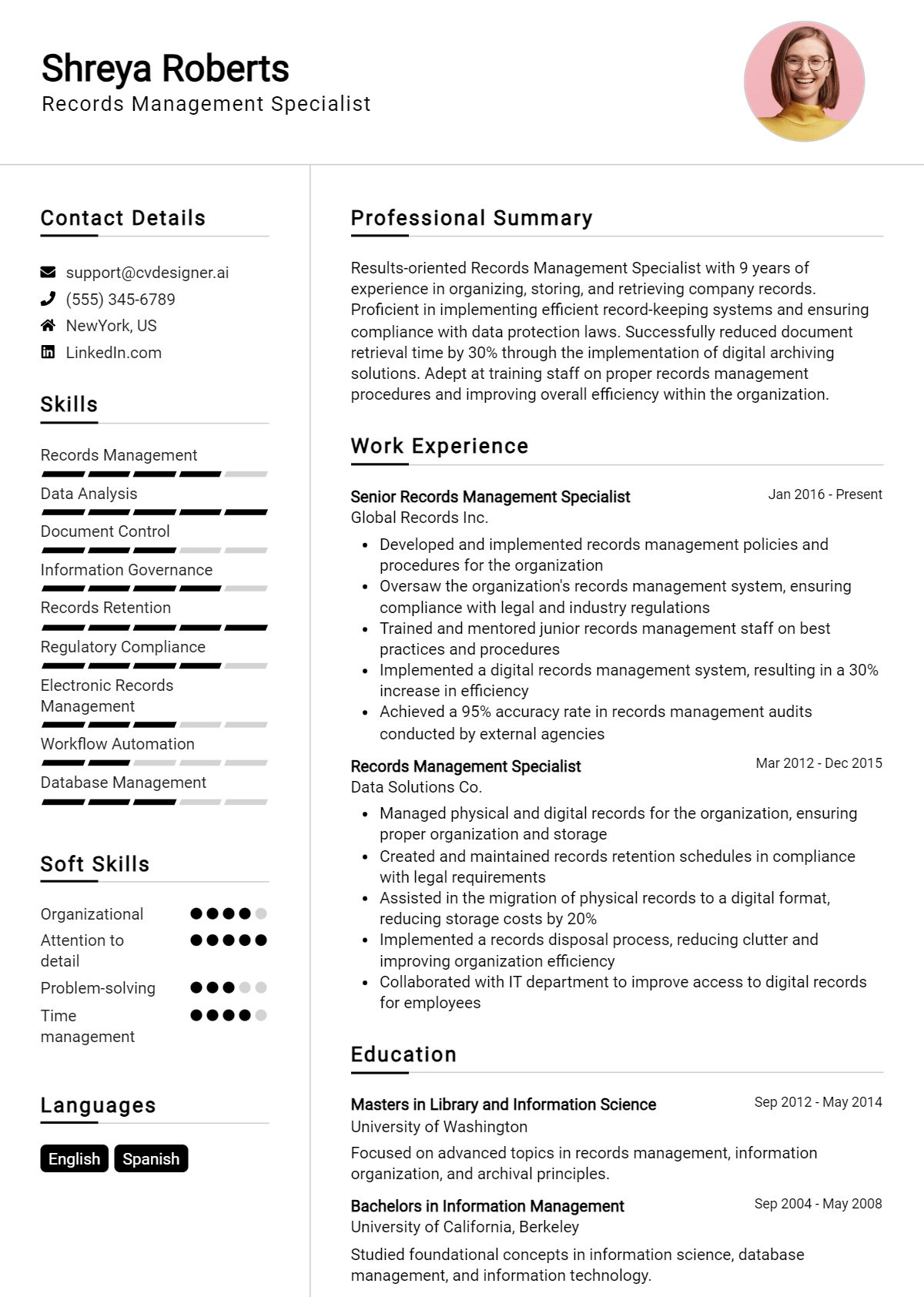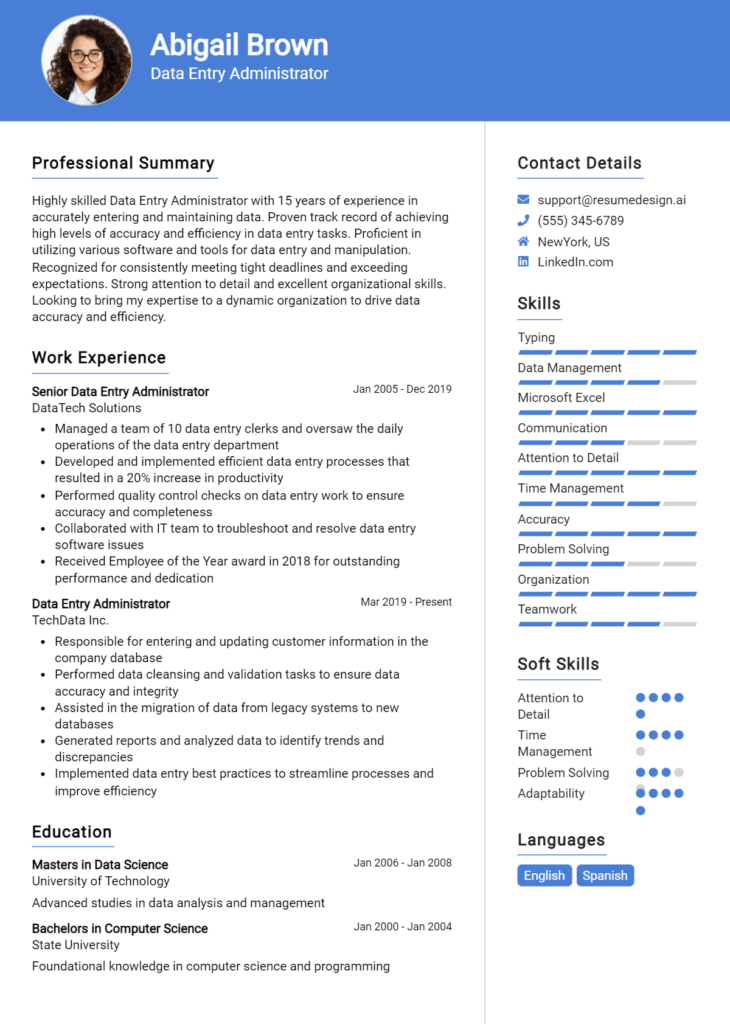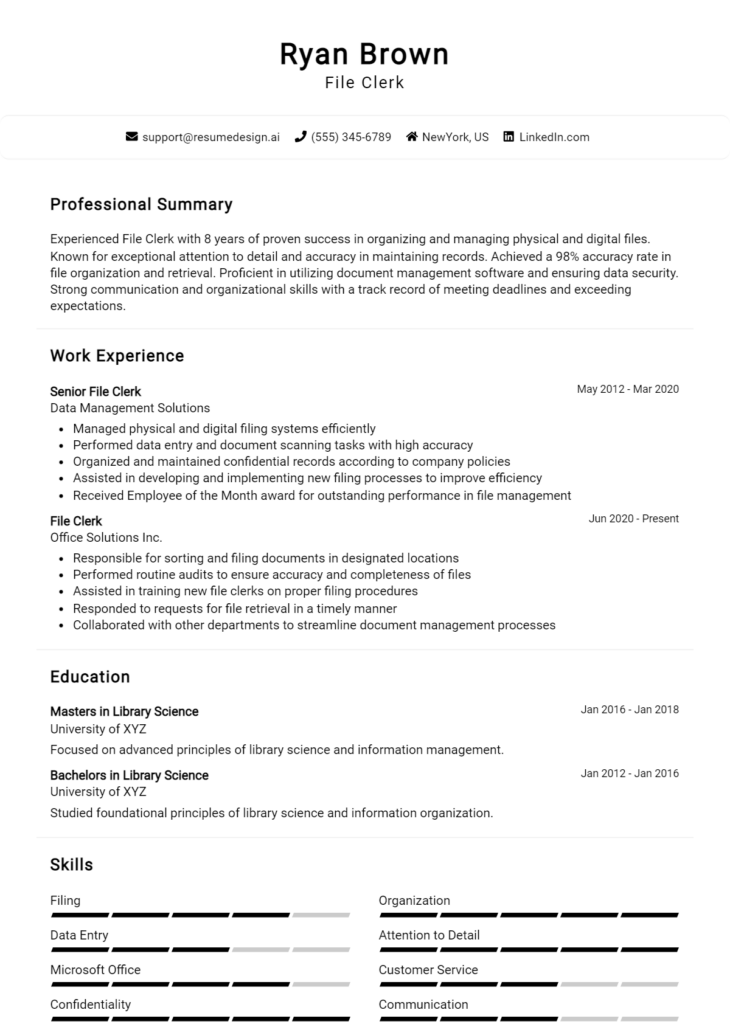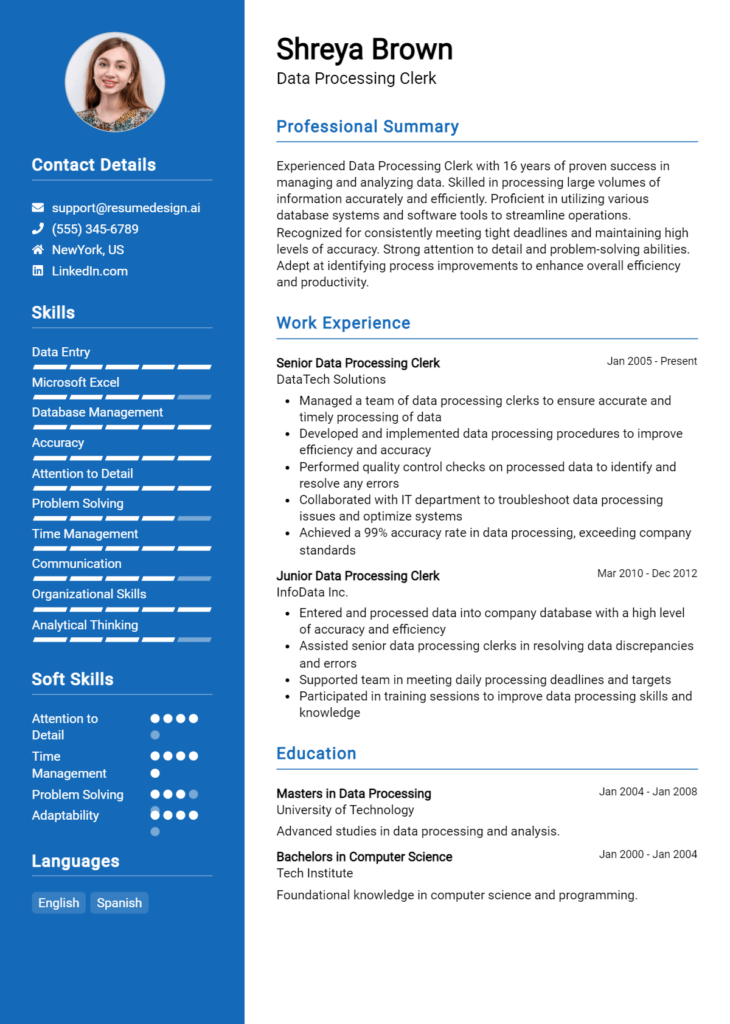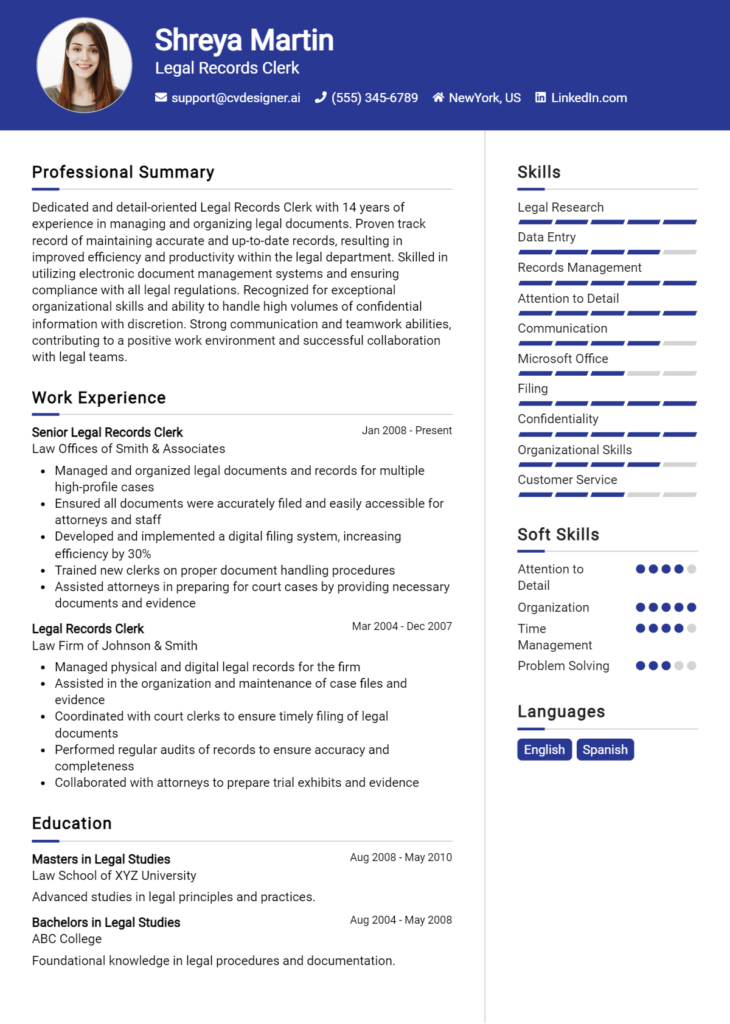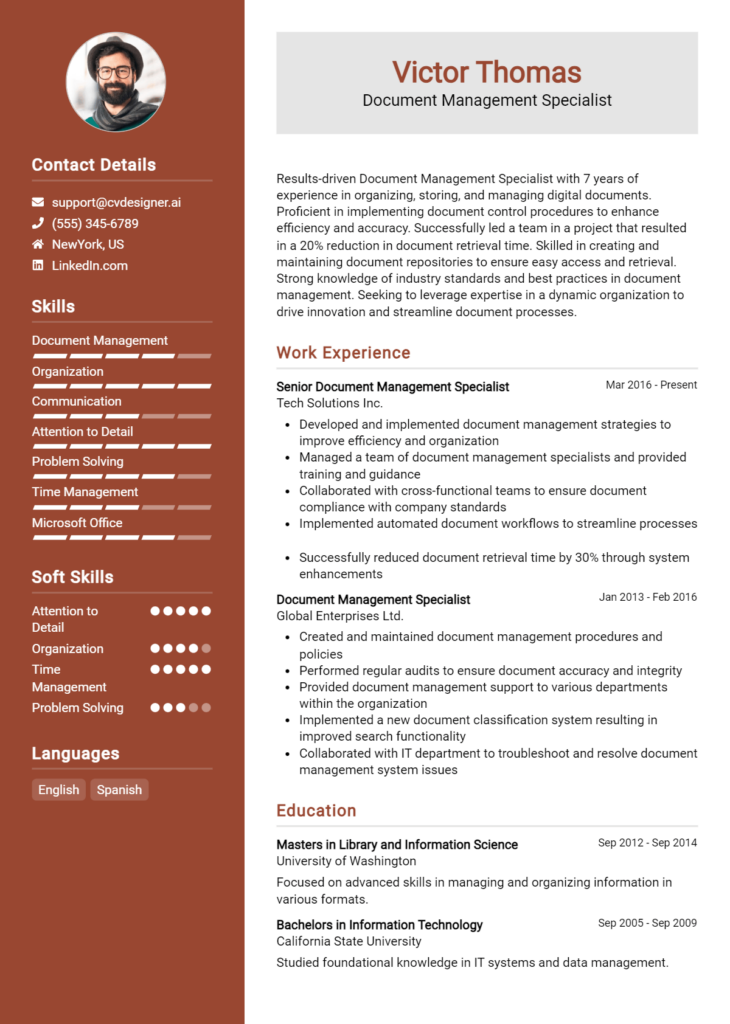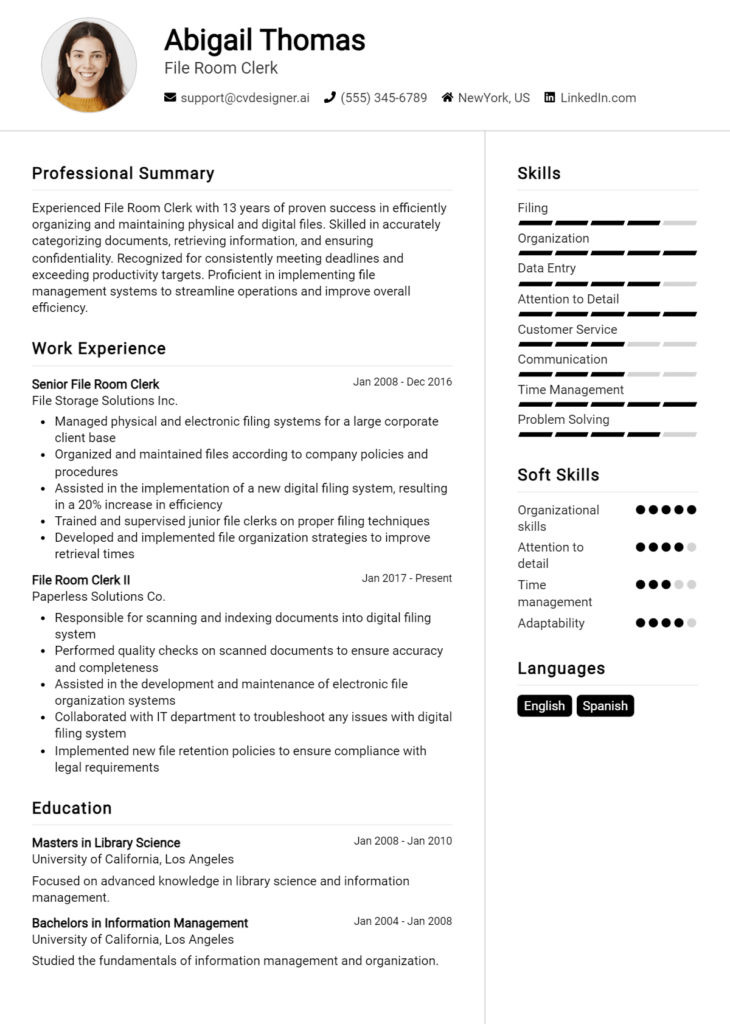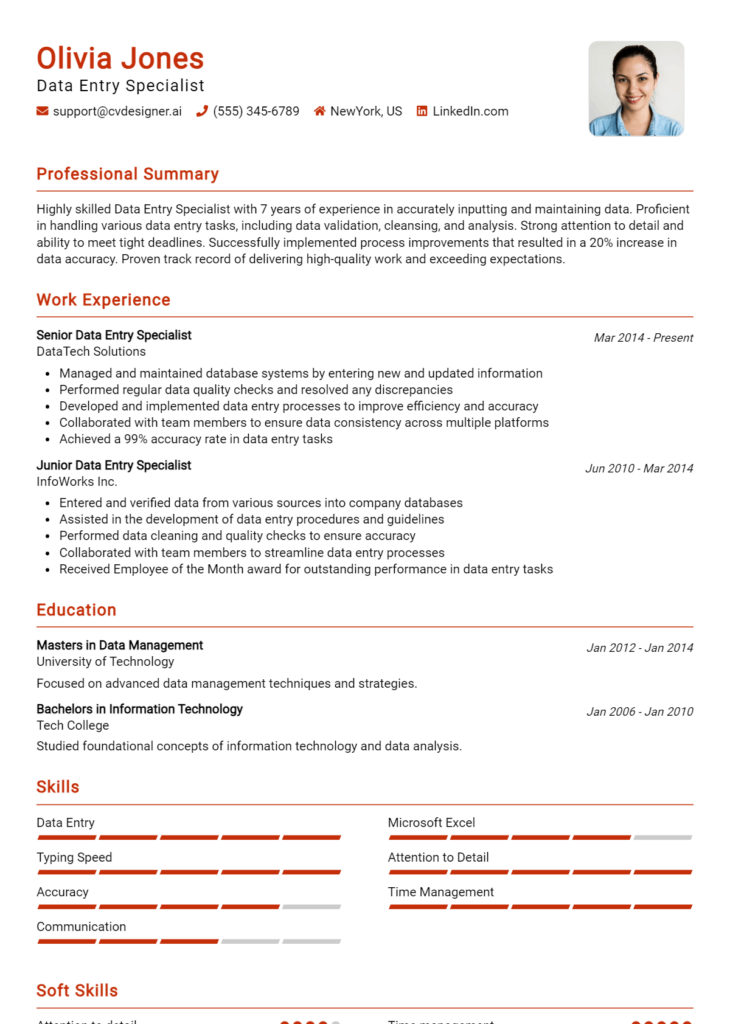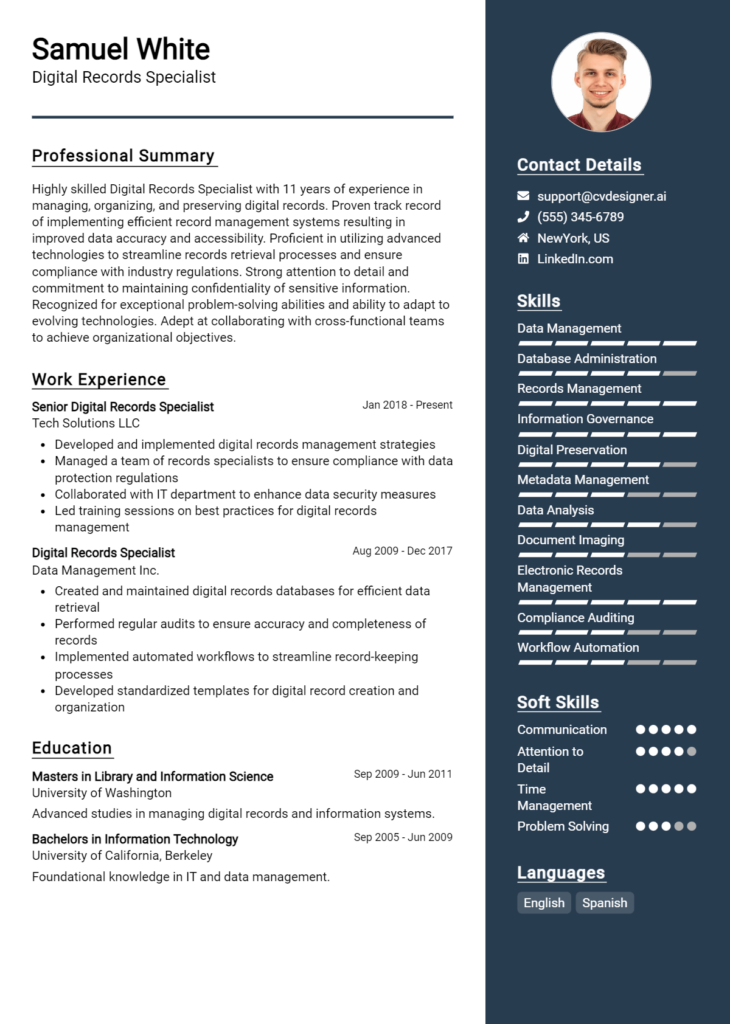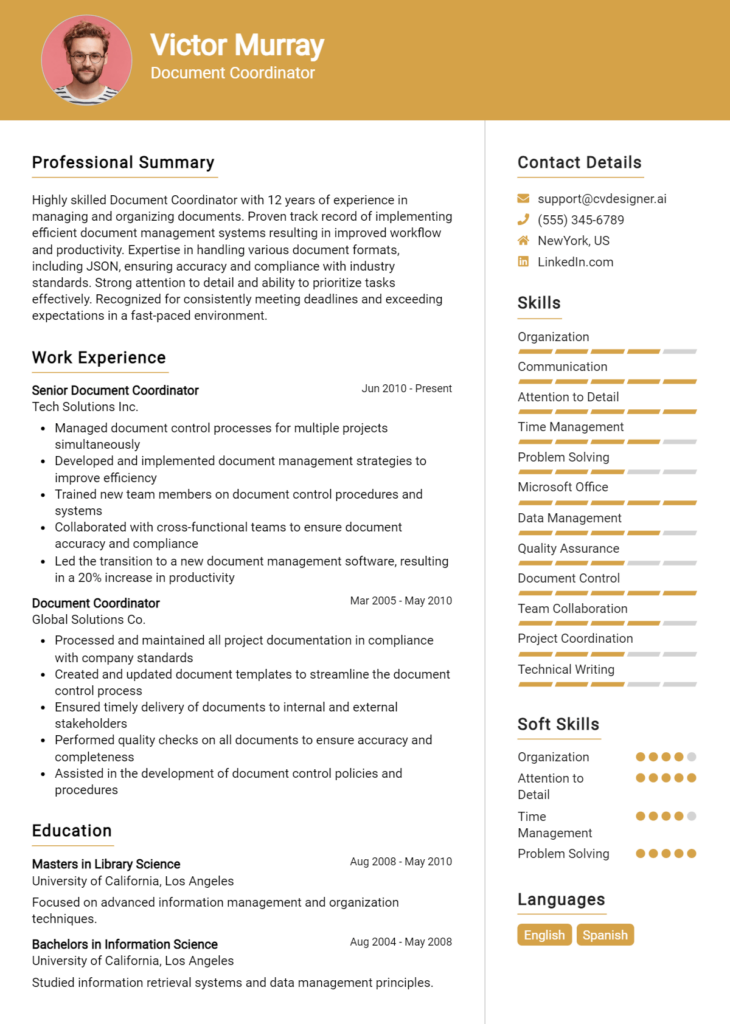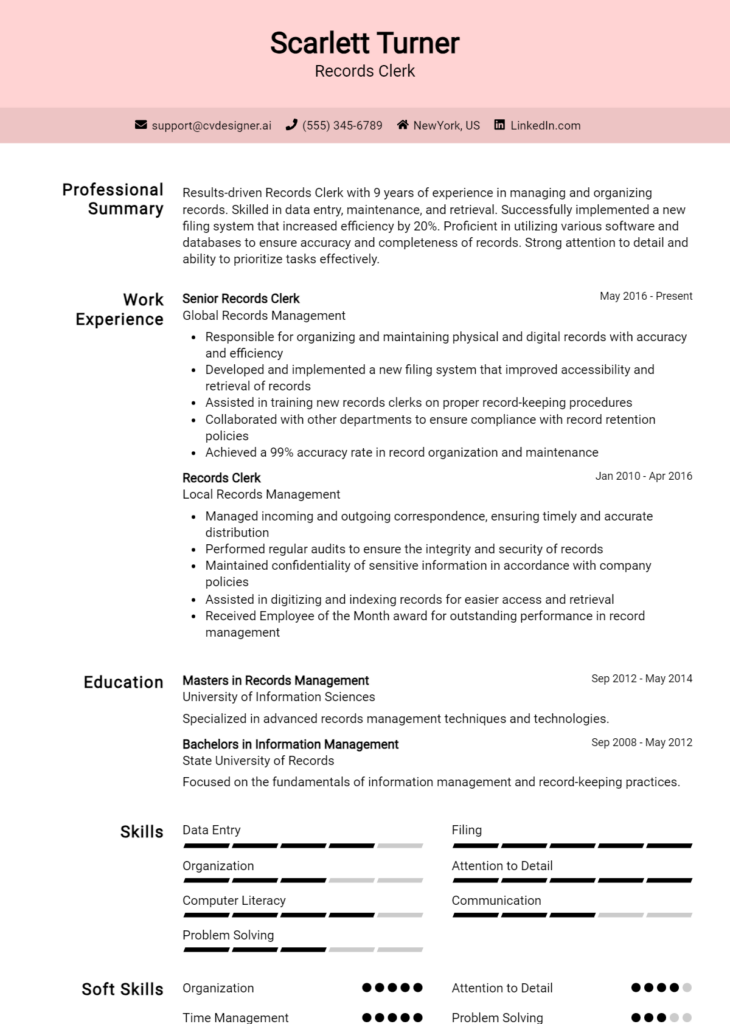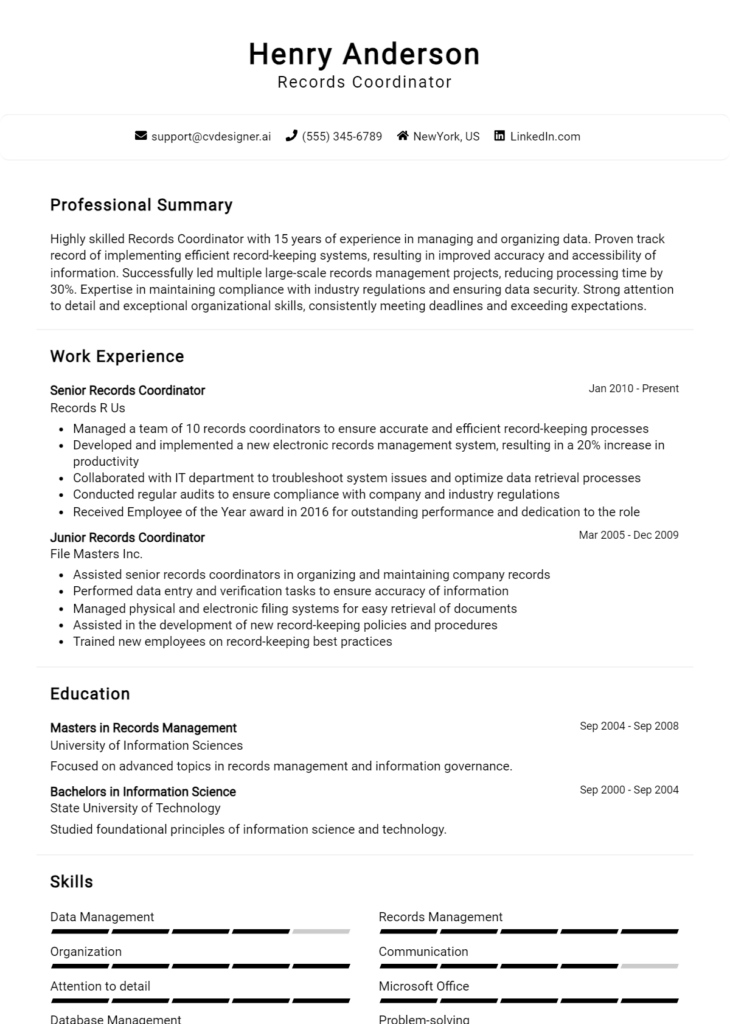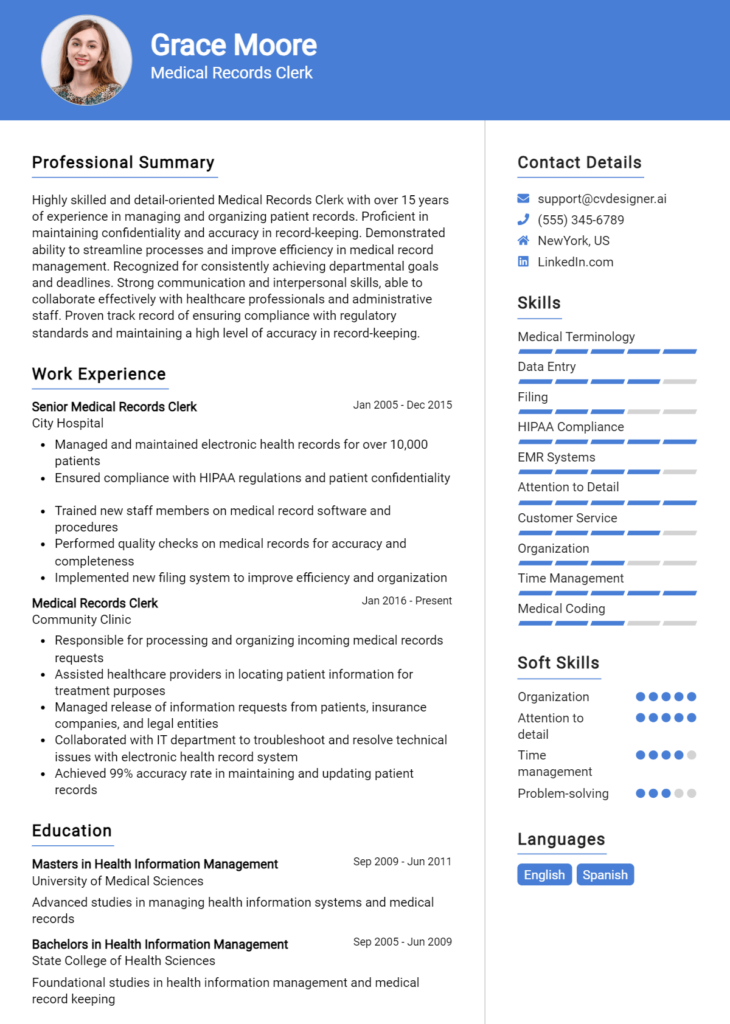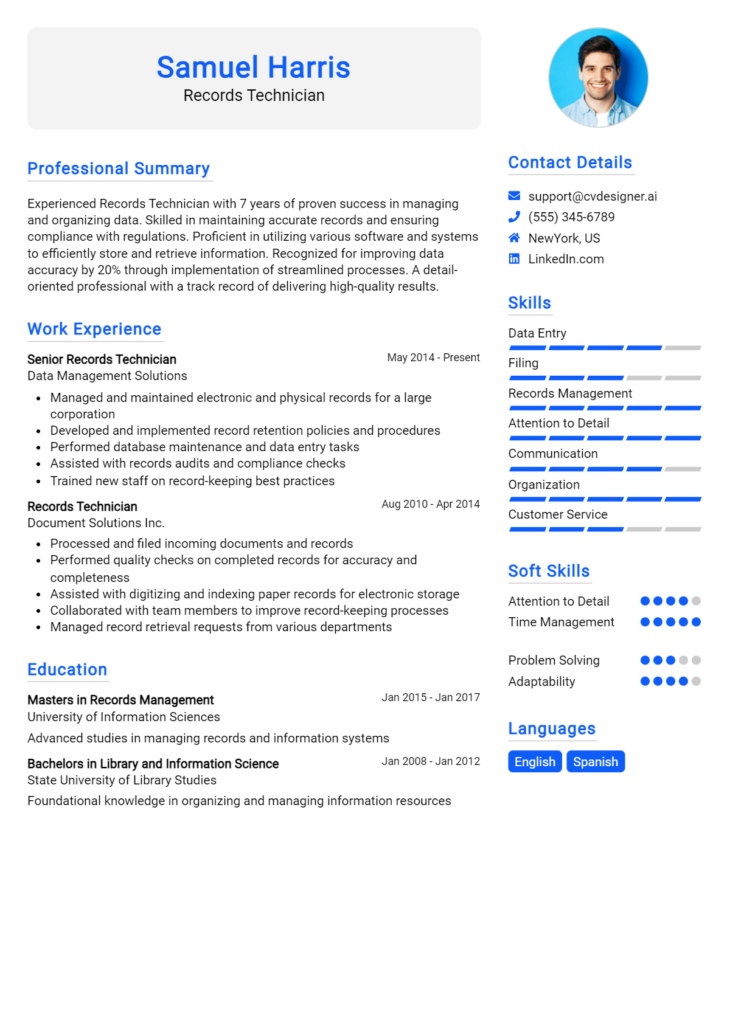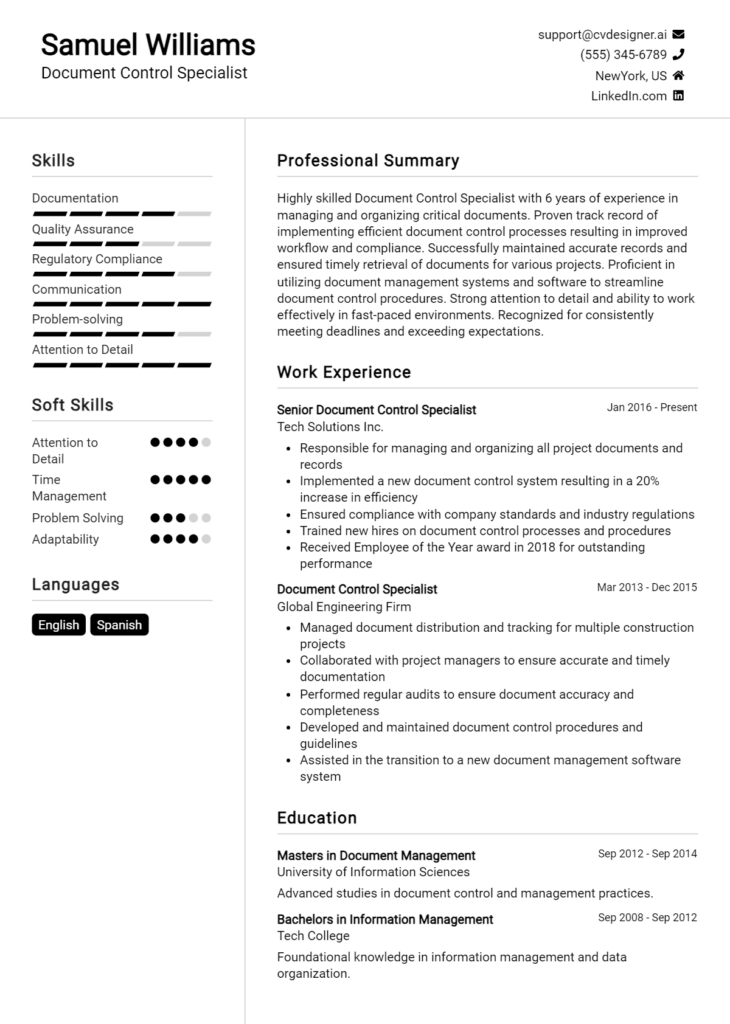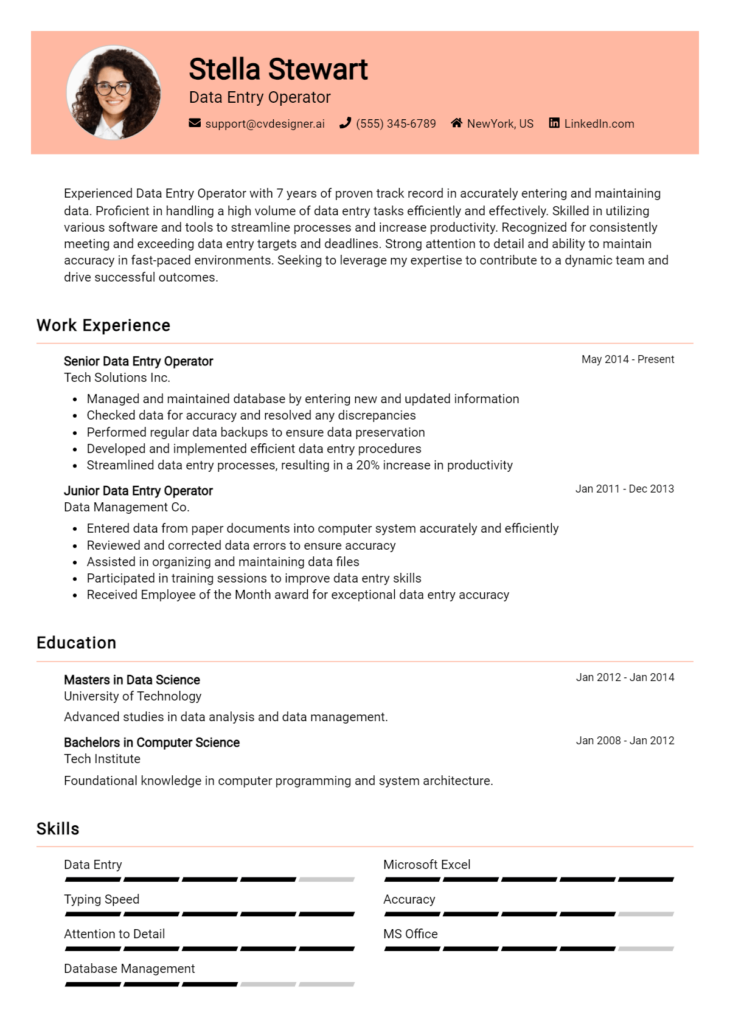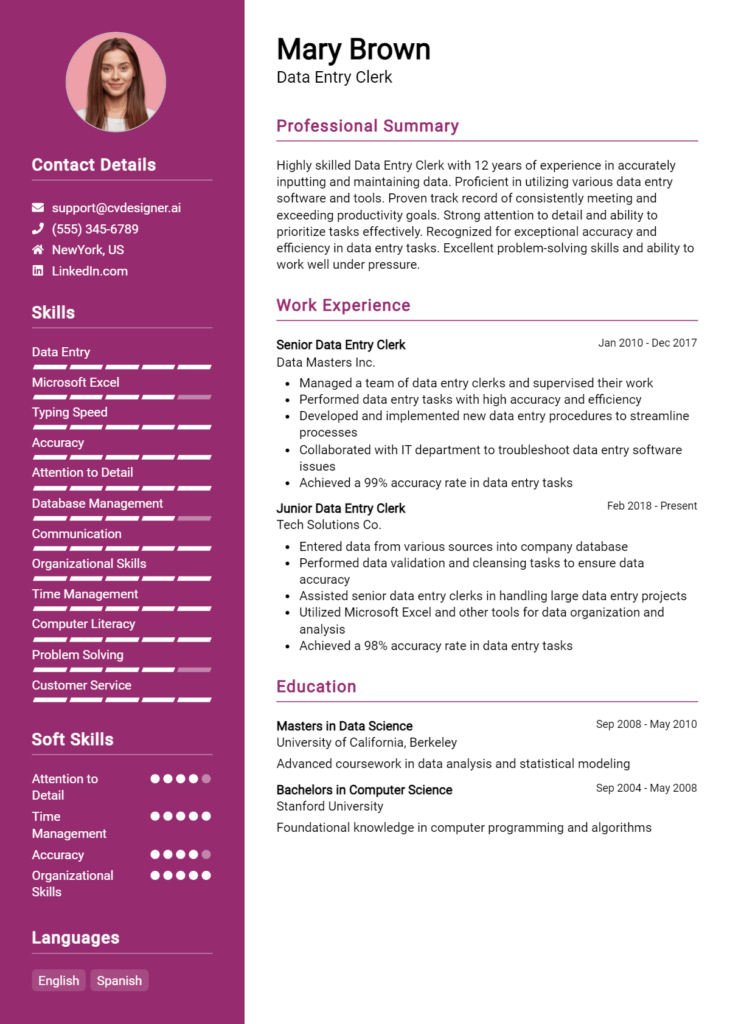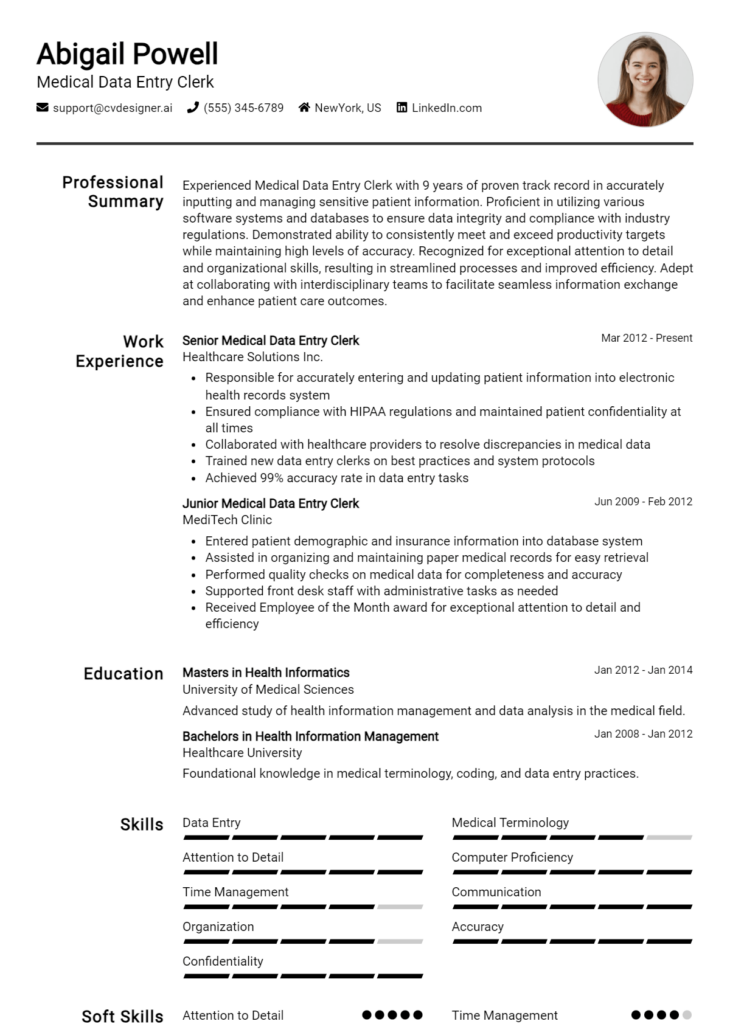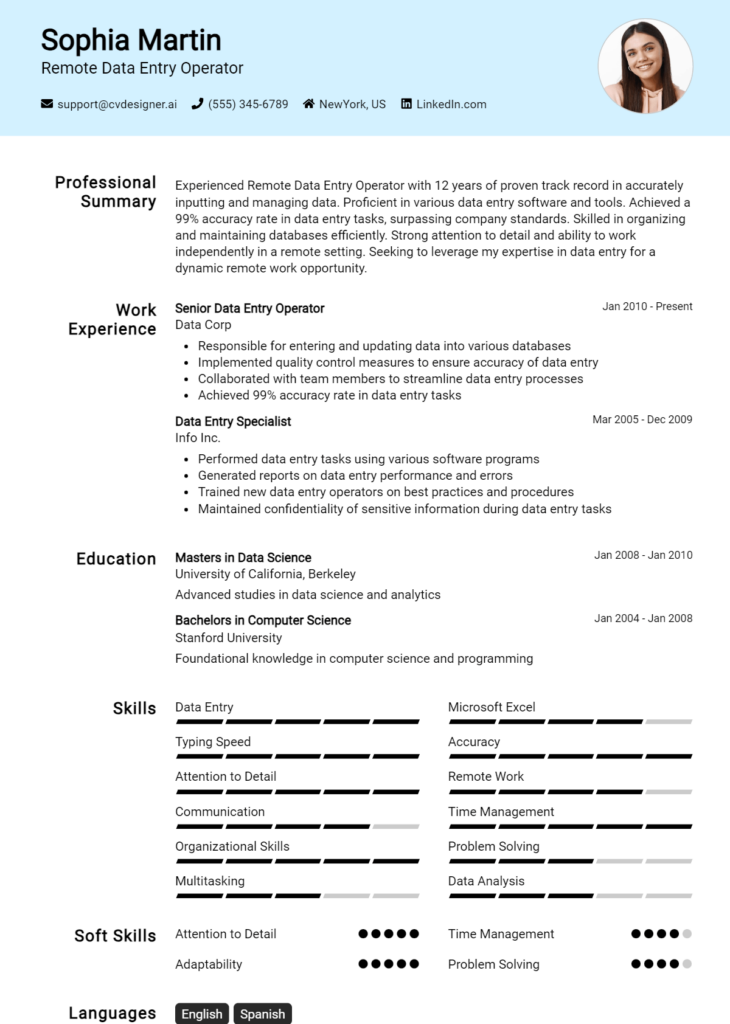Records Management Specialist Core Responsibilities
A Records Management Specialist plays a crucial role in maintaining and organizing an organization’s records, ensuring compliance with regulations and facilitating easy access across departments. Key responsibilities include implementing record-keeping systems, assessing records for accuracy, and providing training to staff. Essential skills encompass technical proficiency with software, operational efficiency, and strong problem-solving abilities. These competencies are vital in supporting organizational goals, and a well-structured resume can effectively highlight these qualifications, showcasing the candidate's overall value to the organization.
Common Responsibilities Listed on Records Management Specialist Resume
- Develop and implement records management policies and procedures.
- Maintain and update electronic and physical filing systems.
- Ensure compliance with legal and regulatory requirements.
- Conduct regular audits of records for accuracy and completeness.
- Train staff on records management best practices.
- Coordinate the retention and disposal of records according to policies.
- Assist with the retrieval of records for internal and external requests.
- Utilize records management software for data entry and tracking.
- Collaborate with different departments to meet records management needs.
- Prepare reports on records management activities and compliance.
- Implement data security measures to protect sensitive information.
- Manage archiving processes for long-term record storage.
High-Level Resume Tips for Records Management Specialist Professionals
In today's competitive job market, a well-crafted resume is essential for Records Management Specialist professionals looking to make a strong impression on potential employers. Your resume often serves as the first point of contact, and it is crucial that it effectively highlights your skills, achievements, and relevant experience. A compelling resume not only showcases your qualifications but also reflects your understanding of records management principles and best practices. In this guide, we will provide practical and actionable resume tips specifically tailored for Records Management Specialist professionals, helping you stand out in the applicant pool.
Top Resume Tips for Records Management Specialist Professionals
- Tailor your resume to the specific job description by incorporating keywords and phrases that align with the employer's requirements.
- Highlight relevant experience in records management and information governance to demonstrate your expertise in the field.
- Quantify your achievements, such as the number of records managed or improvements in retrieval efficiency, to provide concrete evidence of your impact.
- Showcase industry-specific skills, including knowledge of regulatory compliance, data privacy laws, and electronic records management systems.
- Use a clean and professional format to ensure your resume is easy to read and visually appealing.
- Include certifications or training relevant to records management, such as CRM or RIM, to enhance your credibility.
- Incorporate action verbs in your descriptions to convey a sense of proactivity and accomplishment.
- Highlight any experience with records management software or tools to demonstrate your technical proficiency.
- Consider adding a summary statement at the beginning of your resume that captures your career goals and key qualifications.
By implementing these tips, you can significantly increase your chances of landing a job in the Records Management Specialist field. A tailored and well-structured resume will not only showcase your qualifications but also convey your commitment to the profession, making you an attractive candidate to potential employers.
Why Resume Headlines & Titles are Important for Records Management Specialist
In the competitive field of records management, a resume headline or title plays a crucial role in capturing the attention of hiring managers. A well-crafted headline succinctly summarizes a candidate's key qualifications, allowing them to stand out in a sea of applicants. For a Records Management Specialist, an impactful title should be concise, relevant, and directly related to the specific job being applied for. This not only enhances the visibility of the resume but also sets the tone for the applicant's professional narrative, making it easier for employers to quickly assess their fit for the position.
Best Practices for Crafting Resume Headlines for Records Management Specialist
- Keep it concise: Aim for a headline that is 5-10 words long.
- Be role-specific: Use terminology that reflects the records management field.
- Highlight key qualifications: Focus on skills, experience, or certifications relevant to the job.
- Use action-oriented language: Start with strong verbs or adjectives to convey confidence.
- Avoid jargon: Ensure that the language is clear and understandable to all readers.
- Tailor for each application: Customize the headline for each job you're applying to.
- Incorporate keywords: Use industry-specific keywords that match the job description.
- Reflect accomplishments: If possible, include measurable achievements to enhance credibility.
Example Resume Headlines for Records Management Specialist
Strong Resume Headlines
"Certified Records Management Specialist with 5+ Years of Experience in Compliance"
"Detail-Oriented Records Management Expert Specializing in Digital Conversion"
"Proven Track Record in Implementing Records Management Systems for Efficiency"
Weak Resume Headlines
"Records Management Specialist"
"Seeking a Job in Records Management"
Strong resume headlines are effective because they provide a clear and immediate understanding of the candidate's unique qualifications and professional identity. They incorporate relevant keywords and showcase specific skills or accomplishments, making it easier for hiring managers to recognize the candidate as a suitable fit for the position. In contrast, weak headlines tend to be vague and generic, failing to convey any significant information about the candidate's capabilities or experiences. This lack of specificity can lead hiring managers to overlook these resumes in favor of candidates who present themselves more compellingly.
Writing an Exceptional Records Management Specialist Resume Summary
A well-crafted resume summary is crucial for a Records Management Specialist, as it serves as the first impression for hiring managers. This brief yet powerful section quickly captures attention by highlighting essential skills, relevant experience, and notable accomplishments in the field of records management. A strong summary not only showcases the candidate's qualifications but also aligns with the specific job requirements, ensuring that the candidate stands out in a competitive job market. It should be concise, impactful, and tailored to reflect the unique aspects of the position being applied for, allowing hiring managers to quickly assess the candidate's suitability for the role.
Best Practices for Writing a Records Management Specialist Resume Summary
- Quantify Achievements: Use numbers and statistics to demonstrate your impact, such as the volume of records managed or efficiency improvements.
- Focus on Relevant Skills: Highlight key skills that are directly related to records management, such as data organization, compliance knowledge, and information retrieval.
- Tailor the Summary: Customize your resume summary for each job application to reflect the specific requirements and keywords from the job description.
- Keep it Concise: Aim for 3-5 sentences that clearly convey your qualifications without unnecessary detail.
- Use Action Verbs: Start sentences with strong action verbs to convey a sense of proactivity and effectiveness.
- Showcase Industry Knowledge: Include relevant terminology and familiarity with regulatory standards to demonstrate expertise in records management.
- Highlight Problem-Solving Skills: Mention any experience in identifying and resolving issues related to records management processes.
- Include Professional Certifications: If applicable, mention any relevant certifications to enhance your credibility in the field.
Example Records Management Specialist Resume Summaries
Strong Resume Summaries
Detail-oriented Records Management Specialist with over 7 years of experience managing digital and physical records for large organizations. Successfully implemented a new filing system that improved retrieval times by 30%, ensuring compliance with industry regulations.
Results-driven professional with expertise in records management and information governance. Led a project that reduced document retrieval time by 40%, leveraging advanced technologies and process optimization techniques.
Skilled Records Management Specialist with a proven track record in maintaining accurate records for over 10,000 files while training staff on compliance procedures. Achieved a 25% reduction in audit discrepancies through meticulous record-keeping practices.
Weak Resume Summaries
Experienced records manager looking for a new opportunity in a company that values records management.
Records Management Specialist with a background in various administrative tasks and a general understanding of managing records.
The examples of strong resume summaries are effective because they provide specific details, quantify achievements, and directly relate to the responsibilities of a Records Management Specialist. They demonstrate a clear understanding of the role and the value the candidate can bring to the organization. In contrast, the weak summaries lack specificity and fail to communicate measurable outcomes or relevant skills, making them less impactful and memorable to hiring managers.
Work Experience Section for Records Management Specialist Resume
The work experience section of a Records Management Specialist resume is vital as it provides a comprehensive overview of the candidate's practical skills and expertise in the field. This section not only highlights their technical abilities in managing records and information systems but also demonstrates their capacity to lead teams effectively and deliver high-quality products. By quantifying achievements and aligning experiences with industry standards, candidates can showcase their contributions to organizational efficiency and compliance, making their resumes stand out to potential employers.
Best Practices for Records Management Specialist Work Experience
- Detail specific technical skills, including software and systems used in records management.
- Quantify accomplishments with metrics, such as percentage improvements in efficiency or compliance rates.
- Highlight leadership roles in managing teams and projects, emphasizing collaborative efforts.
- Include industry-specific keywords to align with job descriptions and standards.
- Showcase experience with records retention policies and regulatory compliance.
- Demonstrate problem-solving abilities through examples of challenges faced and solutions implemented.
- Provide context for achievements, explaining the impact on the organization or team.
- Tailor experiences to reflect the specific needs and requirements of the job being applied for.
Example Work Experiences for Records Management Specialist
Strong Experiences
- Led a team of 5 in the digitization of over 10,000 physical records, resulting in a 40% reduction in retrieval time and improved compliance with data protection regulations.
- Implemented a new records management software that increased data accuracy by 30% and decreased processing errors by 25%, enhancing overall operational efficiency.
- Collaborated with cross-functional teams to establish a records retention schedule that adhered to regulatory standards, reducing audit findings by 50% over two years.
- Trained and mentored junior staff in best practices for records management, leading to a 20% increase in team productivity and morale.
Weak Experiences
- Assisted with records management tasks as needed in various projects.
- Worked on filing systems and maintaining organization of files.
- Participated in team meetings regarding records management.
- Helped with the implementation of new software tools.
The examples provided illustrate the distinction between strong and weak experiences in a Records Management Specialist resume. Strong experiences are characterized by specific achievements, quantifiable results, and a clear demonstration of leadership and collaboration, which effectively showcase the candidate's value. Conversely, weak experiences lack detail and impact, presenting vague responsibilities that do not clearly convey the candidate's skills or contributions to prospective employers.
Education and Certifications Section for Records Management Specialist Resume
The education and certifications section of a Records Management Specialist resume plays a crucial role in showcasing the candidate's academic background and professional qualifications. This section not only highlights relevant degrees and certifications but also reflects the candidate's commitment to continuous learning and staying updated with industry standards. By listing pertinent coursework, industry-recognized certifications, and any specialized training, candidates can significantly enhance their credibility and demonstrate their alignment with the requirements of the job role. A well-crafted education and certifications section can set a candidate apart in a competitive job market, emphasizing their preparedness for the responsibilities of a Records Management Specialist.
Best Practices for Records Management Specialist Education and Certifications
- List relevant degrees in fields such as Information Management, Library Science, or Business Administration.
- Include industry-recognized certifications, such as Certified Records Manager (CRM) or Certified Information Professional (CIP).
- Provide details on specialized training related to records management software or compliance regulations.
- Highlight any coursework that directly pertains to records management, data governance, or archival studies.
- Emphasize continuing education units (CEUs) or workshops that demonstrate commitment to professional development.
- Use clear and concise formatting to make the information easily scannable for hiring managers.
- Prioritize the most relevant and recent qualifications at the top of the section.
- Avoid listing outdated certifications unless they are still recognized in the industry.
Example Education and Certifications for Records Management Specialist
Strong Examples
- Bachelor of Science in Information Management, University of XYZ, 2021
- Certified Records Manager (CRM), Institute of Certified Records Managers, 2022
- Certificate in Digital Archiving, ABC Institute, 2023
- Coursework in Data Governance and Compliance, University of XYZ, 2020
Weak Examples
- Bachelor of Arts in History, University of ABC, 2000
- Certification in Basic Office Management, XYZ Training Center, 2015
- Diploma in Secretarial Studies, DEF College, 1999
- Coursework in General Business Administration, University of GHI, 2005
The strong examples are considered effective because they directly relate to the skills and knowledge required for a Records Management Specialist, showcasing relevant degrees, certifications, and coursework that enhance the candidate's qualifications for the role. In contrast, the weak examples illustrate a lack of relevance to the field, with outdated or unrelated qualifications that do not align with the expectations of a Records Management Specialist position. This distinction is crucial for candidates aiming to demonstrate their suitability for the job.
Top Skills & Keywords for Records Management Specialist Resume
In the competitive field of records management, a well-crafted resume is essential for showcasing your qualifications and expertise. Skills play a critical role in this process, as they not only highlight your proficiency but also align your capabilities with the needs of potential employers. An effective resume for a Records Management Specialist should reflect both hard and soft skills, demonstrating your ability to manage records efficiently and communicate effectively within an organization. By tailoring your resume with the right skills, you can significantly enhance your chances of landing the job.
Top Hard & Soft Skills for Records Management Specialist
Soft Skills
- Attention to Detail
- Organizational Skills
- Communication Skills
- Problem-Solving Skills
- Time Management
- Adaptability
- Team Collaboration
- Customer Service Orientation
- Conflict Resolution
- Critical Thinking
Hard Skills
- Records Management Systems (RMS)
- Data Entry and Management
- Knowledge of Legal and Regulatory Compliance
- Document Imaging and Scanning
- Metadata Management
- Archiving Techniques
- Information Retrieval
- Database Management
- Risk Management
- IT Proficiency (e.g., MS Office Suite, Document Management Software)
By emphasizing these essential skills and complementing them with relevant work experience, you can create a powerful resume that stands out to hiring managers in the field of records management.
Stand Out with a Winning Records Management Specialist Cover Letter
Dear [Hiring Manager's Name],
I am writing to express my interest in the Records Management Specialist position at [Company Name], as advertised on [Where You Found the Job Posting]. With a strong background in records management and a keen attention to detail, I am excited about the opportunity to contribute to your organization by ensuring the integrity, accessibility, and security of vital information. My experience in developing and implementing effective record-keeping systems aligns perfectly with your needs, and I am eager to bring my skills to [Company Name].
In my previous role at [Previous Company Name], I successfully managed the lifecycle of records from creation to disposal, ensuring compliance with all regulatory requirements. I developed streamlined processes that improved retrieval times by 30%, significantly enhancing team productivity. My proficiency in various records management software, coupled with my analytical skills, enables me to maintain organized and efficient records systems. I am also adept at training staff on best practices for records management, fostering a culture of compliance and efficiency.
I am particularly drawn to [Company Name] because of [specific reason related to the company or its mission]. I believe that my proactive approach and dedication to continuous improvement will complement your team well. I am enthusiastic about the prospect of collaborating with cross-functional teams to enhance data management practices, ensuring that all records are not only preserved but also leveraged for strategic decision-making.
Thank you for considering my application. I look forward to the opportunity to discuss how my experience and vision align with the goals of [Company Name]. I am excited about the possibility of contributing to your esteemed organization and am eager to bring my expertise in records management to your team.
Sincerely,
[Your Name]
[Your Phone Number]
[Your Email Address]
Common Mistakes to Avoid in a Records Management Specialist Resume
When crafting a resume for a Records Management Specialist position, it’s crucial to present your skills and experiences effectively. However, many applicants make common mistakes that can hinder their chances of standing out to potential employers. Understanding and avoiding these pitfalls can significantly enhance the quality of your resume and showcase your qualifications in the best light.
Lack of Relevant Keywords: Many applicants fail to incorporate industry-specific keywords, which can prevent their resume from passing through Applicant Tracking Systems (ATS) that screen resumes based on specific terms.
Ignoring Formatting Consistency: A disorganized or inconsistent format can make a resume difficult to read. Ensure that font sizes, styles, and bullet points are uniform throughout the document.
Vague Job Descriptions: Providing generic descriptions of past roles can detract from your qualifications. Be specific about your responsibilities and achievements, including measurable outcomes when possible.
Not Highlighting Soft Skills: While technical skills are essential for a Records Management Specialist, neglecting to mention soft skills such as attention to detail, organization, and communication can leave a gap in your profile.
Overloading with Unrelated Experience: Including too much unrelated work experience can dilute your resume’s focus. Tailor your work history to emphasize roles and responsibilities that align closely with records management.
Neglecting Professional Development: Failing to mention certifications, training, or continuing education related to records management can signal a lack of commitment to professional growth in the field.
Forgetting to Proofread: Typos and grammatical errors can undermine your professionalism. Always proofread your resume or have someone else review it to catch any mistakes before submission.
Using an Objective Statement Instead of a Summary: An outdated objective statement can be less impactful than a professional summary that highlights your key qualifications and what you can bring to the organization.
Conclusion
As a Records Management Specialist, you play a crucial role in organizing, maintaining, and protecting an organization's vital records. Your expertise not only ensures compliance with legal and regulatory requirements but also enhances operational efficiency. Key responsibilities include developing records management policies, implementing retention schedules, and utilizing electronic systems for effective record-keeping. Additionally, your ability to train staff on records handling and best practices is vital for fostering a culture of compliance within the organization.
In conclusion, it’s essential to keep your Records Management Specialist resume updated and tailored to highlight your unique skills and experiences. Take the time to review and refine your resume to ensure it effectively showcases your qualifications. To assist you in this process, consider utilizing resources such as resume templates, which provide professional layouts, or try our resume builder for a user-friendly experience. Additionally, explore resume examples for inspiration and check out our cover letter templates to complement your application. Start enhancing your resume today to stand out in the competitive job market!

